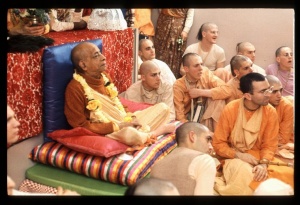CC Antya 3.150 (1975): Difference between revisions
(Vanibot #0027: CCMirror - Mirror CC's 1996 edition to form a basis for 1975) |
(Vanibot #0020: VersionCompareLinker - added a link to the Version Compare feature) |
||
| Line 2: | Line 2: | ||
<div style="float:left">'''[[Sri Caitanya-caritamrta (1975)|Śrī Caitanya-caritāmṛta (1975)]] - [[CC Antya (1975)|Antya-līlā]] - [[CC Antya 3 (1975)|Chapter 3: The Glories of Śrīla Haridāsa Ṭhākura]]'''</div> | <div style="float:left">'''[[Sri Caitanya-caritamrta (1975)|Śrī Caitanya-caritāmṛta (1975)]] - [[CC Antya (1975)|Antya-līlā]] - [[CC Antya 3 (1975)|Chapter 3: The Glories of Śrīla Haridāsa Ṭhākura]]'''</div> | ||
<div style="float:right">[[File:Go-previous.png|link=CC Antya 3.149 (1975)|Antya-līlā 3.149]] '''[[CC Antya 3.149 (1975)|Antya-līlā 3.149]] - [[CC Antya 3.151 (1975)|Antya-līlā 3.151]]''' [[File:Go-next.png|link=CC Antya 3.151 (1975)|Antya-līlā 3.151]]</div> | <div style="float:right">[[File:Go-previous.png|link=CC Antya 3.149 (1975)|Antya-līlā 3.149]] '''[[CC Antya 3.149 (1975)|Antya-līlā 3.149]] - [[CC Antya 3.151 (1975)|Antya-līlā 3.151]]''' [[File:Go-next.png|link=CC Antya 3.151 (1975)|Antya-līlā 3.151]]</div> | ||
{{CompareVersions|CC|Antya 3.150|CC 1975|CC 1996}} | |||
{{RandomImage}} | {{RandomImage}} | ||
==== TEXT 150 ==== | ==== TEXT 150 ==== | ||
| Line 32: | Line 31: | ||
<div class="purport"> | <div class="purport"> | ||
Well-to-do Hindu gentlemen constructed their houses with a place called the Durgā-maṇḍapa for the worship of the goddess Durgā. There they generally held worship of the goddess every year in the month of Āśvina ( | Well-to-do Hindu gentlemen constructed their houses with a place called the Durgā-maṇḍapa for the worship of the goddess Durgā. There they generally held worship of the goddess every year in the month of Āśvina (October). Rāmacandra Khān possessed such a Durgā-maṇḍapa at his residence. | ||
</div> | </div> | ||
Latest revision as of 01:04, 27 January 2020

His Divine Grace
A.C. Bhaktivedanta Swami Prabhupada
A.C. Bhaktivedanta Swami Prabhupada
TEXT 150
- sarvajña nityānanda āilā tāra ghare
- āsiyā vasilā durgā-maṇḍapa-upare
SYNONYMS
sarva-jña—omniscient; nityānanda—Lord Nityānanda; āilā—came; tāra ghare—at his house; āsiyā—coming; vasilā—sat down; durgā-maṇḍapa-upare—on the altar of the Durgā-maṇḍapa.
TRANSLATION
Lord Nityānanda, who is omniscient because He is the Supreme Personality of Godhead, came to the house of Rāmacandra Khān and sat down on the altar of the Durgā-maṇḍapa.
PURPORT
Well-to-do Hindu gentlemen constructed their houses with a place called the Durgā-maṇḍapa for the worship of the goddess Durgā. There they generally held worship of the goddess every year in the month of Āśvina (October). Rāmacandra Khān possessed such a Durgā-maṇḍapa at his residence.